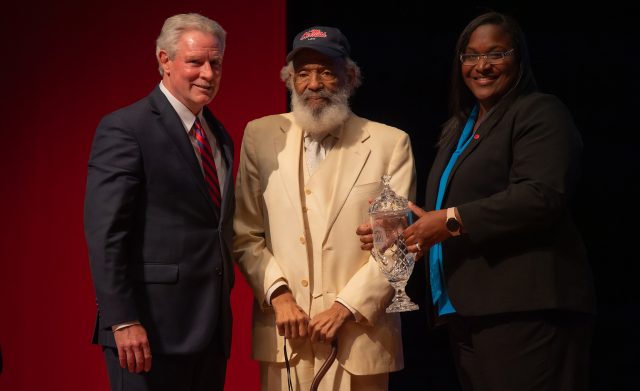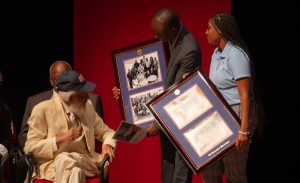
Chancellor Glenn Boyce (left) and Shawnboda Mead (right), UM vice chancellor for diversity and community engagement, present James Meredith with the Mississippi Humanitarian Award on Wednesday (Sept. 28) at the Gertrude C. Ford Center for the Performing Arts. The honor is one of the university’s most distinguished awards. Photo by Kevin Bain/Ole Miss Digital Imaging Services
OXFORD, Miss. – James Meredith became the fifth individual in the University of Mississippi‘s history to receive one of the university’s most prestigious honors, the Mississippi Humanitarian Award.
Announced Wednesday (Sept. 28) during “The Mission Continues: Building Upon the Legacy,” the signature event of the university’s commemoration of the 60th anniversary of integration, the Mississippi Humanitarian Award is an honor rarely bestowed to those who have shown commitment to bettering society and creation of lasting change in the state.
The Mississippi Humanitarian Award has been given to only four other changemakers since it was established. The first award was given in 2001 to philanthropist and education champion Jim Barksdale and his late wife, Sally McDonnell Barksdale. In 2003, the late former governor of Mississippi, William Winter and his late wife, Elise Winter, received the award. In 2013, the university honored Myrlie Evers-Williams, wife of slain civil rights icon Medgar Evers. The most recent recipient was the late U.S. Sen. Thad Cochran in 2018.
“With the addition of Mr. Meredith, you can see this award recognizes and celebrates remarkable individuals whose extraordinary leadership and advocacy have withstood the test of time,” UM Chancellor Glenn Boyce said during the signature event. “His example propels this university’s ongoing commitment for every person to thrive … to be where dreams and aspirations are built and made.”
Boyce said Meredith earned the award both for his work at the university and his longtime advocacy efforts across the state. Meredith empowered the advancement of society, compelled others to acknowledge the equality of all individuals and inspired others to stand up to inequality, Boyce said.
The award was not simply a recognition of what Meredith did in the past, he said, but a mark of appreciation for the lasting impact he continues to make.

James Meredith (left) is presented one of several awards and recognitions Wednesday (Sept. 28) during ‘The Mission Continues: Building Upon the Legacy,’ the signature event commemorating the 60th anniversary of his enrollment at the University of Mississippi. Photo by Thomas Graning/Ole Miss Digital Imaging Services
“We recognize him as a brave and bold humanitarian,” Boyce said. “He is a living reminder that we all must be willing to demonstrate selflessness, courage and dedication through our words and, perhaps even more so, through our actions to forge a just society that holds steadfast to improving the lives of all.”
On Oct. 1, 1962, Meredith became the first African American to enroll at UM, an action that sparked a riot on campus resulting in two dead and more than 300 injured. Integrating the university was a marker that bolstered integration efforts across the state, said Donald Cole, retired UM assistant provost and assistant to the chancellor for multicultural affairs.
“Sixty years ago, our university was in turmoil,” Cole said Wednesday night. “We were a closed society. One that perpetuated among itself views that were flawed. Philosophies that were long outdated and myths that had no truth to it. We needed help.”
Meredith’s enrollment on campus was the starting point of opening that closed society, Cole said.
Following the events of late September and early October 1962, Meredith spent two semesters at UM before graduating in August 1963 with a degree in political science. Following graduation, Meredith continued to study political science at University of Ibadan in Nigeria before earning a law degree at Columbia University.
In 1966, Meredith began the “March Against Fear,” a walk from Memphis, Tennessee, to Jackson, Mississippi. The march, intended to highlight racial inequality in Mississippi, came to a quick and violent halt when Meredith was shot and injured on the second day.
Leaders of major civil rights organizations took up the cause and vowed to complete the march in Meredith’s stead. When Meredith was released from the hospital, he rejoined the march, which gained thousands of participants after the news of Meredith’s attack.
By the time they reached Jackson in June 1966, what began as a solo march entered the state’s capital with more than 15,000 people in its train.
In the ensuing years, Meredith would serve on the staffs of U.S. senators, work in several different states in political offices and self-publish several books on politics and society.

James Meredith shows off the numerous awards and recognitions presented to him Wednesday (Sept. 28) during ‘The Mission Continues: Building Upon the Legacy,’ the signature event commemorating the 60th anniversary of his enrollment at the University of Mississippi. Photo by Thomas Graning/Ole Miss Digital Imaging Services
In 2006, the university dedicated a statue in his honor, which now stands behind the Lyceum. In 2012, Meredith accepted the Harvard Graduate School of Education’s Medal for Education Impact.
The city of Oxford announced last week that the board of aldermen had voted to recognize Oct. 1 as James Meredith Day. During the signature event, the university bestowed Meredith with more than a half-dozen gifts, scholarships and honors.
Additionally, the Mississippi Humanitarian Award includes a monetary prize for the recipient to continue their work in a manner that they choose.
Earlier in the evening, Meredith shared remarks with the crowd where he expressed his gratitude to the university for the occasion.
“I can assure you, in my opinion, this is the best day I ever lived,” Meredith said.
When Chancellor Boyce and Shawnboda Mead, UM vice chancellor for Diversity and Community Engagement, presented him with the Mississippi Humanitarian Award, he smiled and reached out to touch the surface of the large glass chalice.
“While his bold and courageous actions and contributions took place at an institution of higher learning, please make no mistake that Mr. Meredith’s impact extends beyond this university and stretches across this country,” Boyce said. “He single-handedly opened the door to countless educational opportunities for all who followed in his footsteps. He literally changed the trajectory of tens of thousands of lives.”